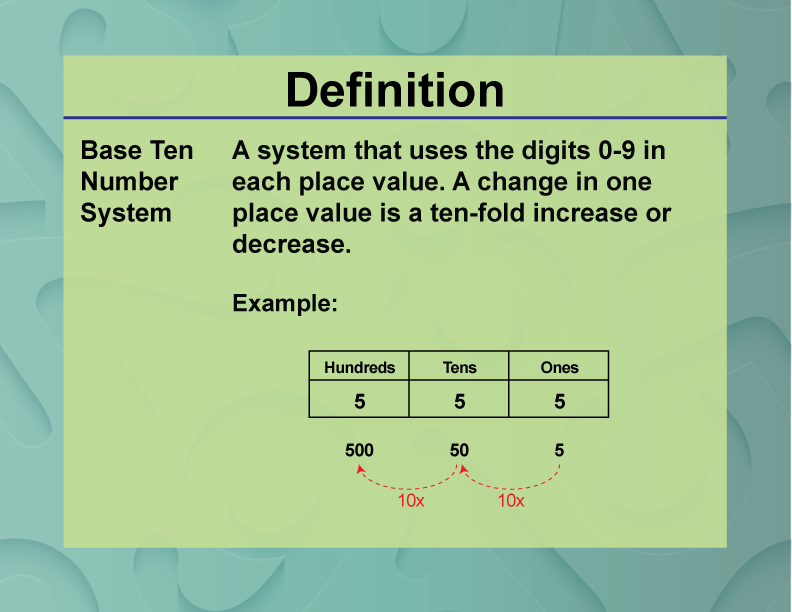
Display Title
Definition--Place Value Concepts--Base Ten Number System
Display Title
Base Ten Number System

Topic
Place Value
Definition
The base ten number system is a positional numeral system that uses ten as its base and includes the digits 0-9.
Description
The base ten number system, also known as the decimal system, is the most widely used numeral system in the world. It is a positional system, meaning the value of a digit depends on its position within a number. Each position represents a power of ten, making it easy to perform arithmetic operations such as addition, subtraction, multiplication, and division.
In real-world applications, the base ten system is used in everyday counting, financial transactions, measurements, and scientific calculations. For example, when measuring length, weight, or volume, units are often based on powers of ten, such as meters, grams, and liters.
In algebra, the base ten system is fundamental for understanding polynomial expressions and their operations. For instance, the polynomial
4x3 + 3x2 + 2x + 1
can be interpreted using the base ten system, where each term represents a different power of ten.
Teaching the base ten number system is crucial for math education as it provides the foundation for all numerical and arithmetic concepts. Understanding this system helps students develop numerical fluency and prepares them for more advanced mathematical topics.
Teacher's Script: "The base ten system uses the digits 0-9. For example, the number 345 means 3 hundreds, 4 tens, and 5 units. Each digit's value depends on its position."
For a complete collection of terms related to Place Value click on this link: Place Value Collection
| Common Core Standards | CCSS.MATH.CONTENT.1.NBT.B.2, CCSS.MATH.CONTENT.1.NBT.C.4, CCSS.MATH.CONTENT.2.NBT.A.1, CCSS.MATH.CONTENT.3.NBT.A.1, CCSS.MATH.CONTENT.4.NBT.A.1, CCSS.MATH.CONTENT.5.NBT.A.4 |
|---|---|
| Grade Range | 1 - 4 |
| Curriculum Nodes |
Arithmetic • Numbers and Patterns • Place Value |
| Copyright Year | 2021 |
| Keywords | place value |